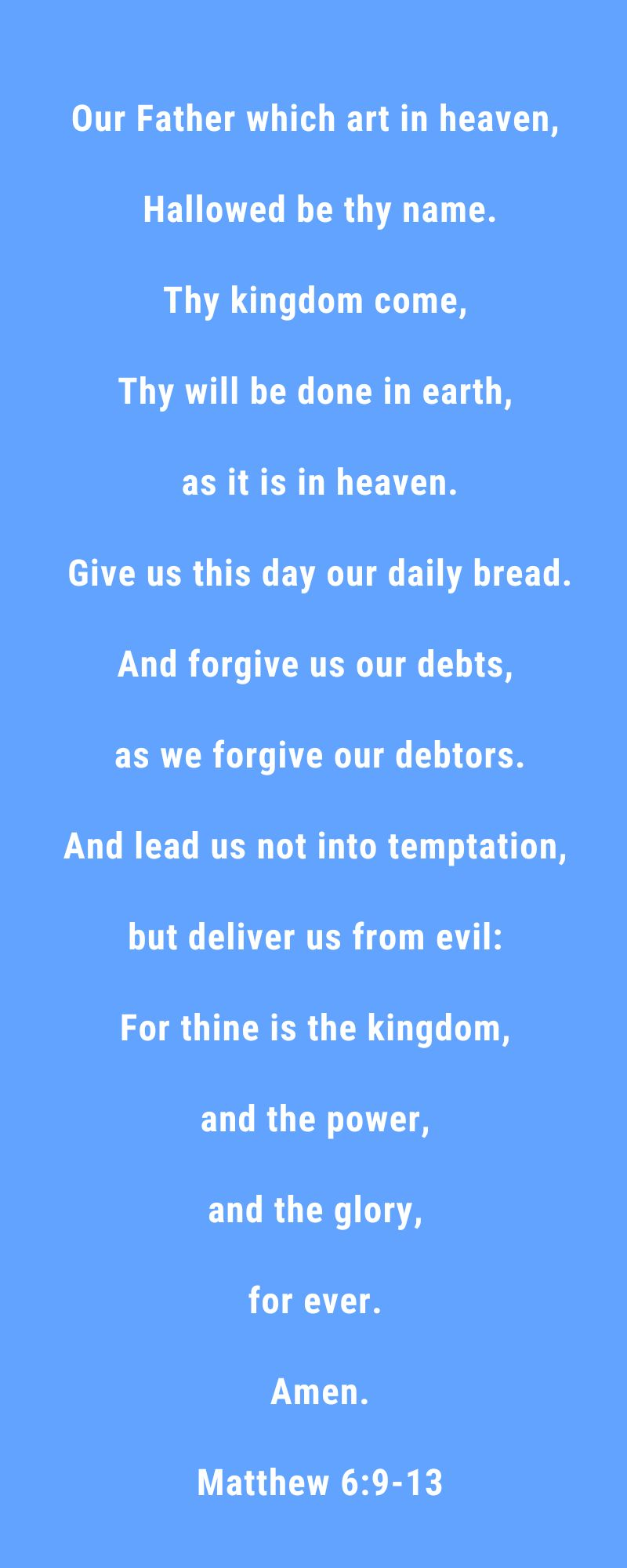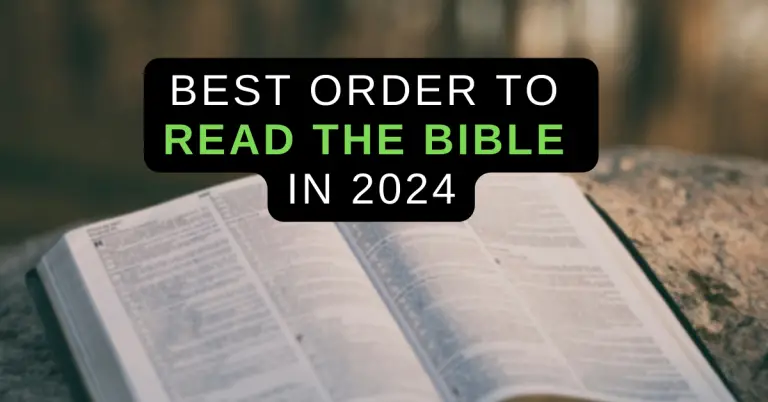The Basic Guide To The Lord’s Prayer In The Bible (2023)
Do you want to understand the meaning of the Lord’s Prayer in the Bible? This article will give you the basic guide to the Lord’s prayer.
Christians throughout the generations have prayed this iconic prayer in Christianity.
This prayer has served to teach believers the basic prayer life.
It has become a beloved staple within Christian communities.
It was brought forth during moments of joy or pain as individuals and congregations sought to draw closer to God through their faith.
It has become a primary spiritual guidance and consolation source for many believers worldwide.
Nevertheless, it is a simple yet profound prayer in the Bible.
Pastors can preach multiple sermons on the Lord’s prayer.
So, it is essential to explore the depth and breadth of these words of this prayer.
By exploring the context, themes, structure, origin and application of bible verses in this unique model prayer, we can gain greater insight into how the Lord’s Prayer can turn the world upside down and even forgive us from the evil of our sins.
What Is The Lord’s Prayer?
All Christians should know about praying the Lord’s Prayer.
I attended a Chinese school on Saturday at a Presbyterian church. During chapel, my classmates and I would always recite the Lord’s Prayer in Chinese. However, I needed help understanding what I was praying about.
I eventually learned about the Lord’s prayer as I studied the Holy Bible, listened to sermons, and participated in Bible study.
The Lord’s prayer is a prayer that Jesus taught to His disciples.
It is considered a model or template of how to pray.
It should more accurately be called the disciples’ prayer. But, we’ll stick with the Lord’s prayer for the sake of this article.
However, we must be mindful that there are many more examples of prayers from the Holy Bible. For example, you can read the book of Psalms as examples of prayers.
For now, the Lord’s prayer in Scripture is presented before us to study and learn.
Where Is The Lord’s Prayer Found In The Bible?
The Holy Spirit sovereignly inspired two passages in two gospels found in the New Testament.
The Gospel of Matthew and Luke records the Lord’s Prayer.
The longer form found in Matthew 6:9-13 is commonly known as it was taught to Jesus’ disciples. This version begins with addressing God directly with “Our Father” and closes with praising Him for His kingdom and power.
In Luke 11:2-4 a shorter variant of the prayer appears, containing fewer words but essentially conveying similar thought as its counterpart in Matthew.
Both versions have many commonalities, including phrases such as Father, hallowed be your name, your name thy kingdom come, asking for our daily bread, seeking forgiveness of our sins, and leading us not into the temptation but to deliver us from evil.
What Is The Context Of The Lord’s Prayer In The Bible?
In the gospel of Matthew, Jesus taught the Lord’s prayer in the middle of a famous sermon called the Sermon on the Mount.
In the Sermon, Jesus taught His disciples what it looks like to live in the kingdom of heaven. This is heaven’s kingdom in contrast to living on earth in the way of the Pharisees.
Preceding the Lord’s prayer, Jesus taught His disciples not to pray and give hypocritically because that is what the Pharisees did.
In the gospel of Luke, one of the disciples of Jesus was asking Him to teach them how to pray. Hence, Jesus teaches them the shorter version of the Lord’s prayer.
So, while the name is famously called the Lord’s Prayer, it should be called the Disciples’ Prayer.
Indeed, we can find the Lord’s prayer in John 17, Jesus’ high priestly prayer. But I digressed.
What Is The Purpose Of The Lord’s Prayer?
We should seek to understand God’s purpose for prayer.
God’s purpose for prayer is to glorify Himself.
Christians should pray not to fulfill a selfish desire but to please the LORD.
But prayer is undoubtedly beneficial for the spiritual growth of the believers. They present their adoration, confession, thanksgiving, and supplication before their heavenly Father in heaven.
What Does The Lord’s Prayer Not Mean?
It is equally important to understand what the Lord’s prayer does not mean.
In the context of the sermon on the mount, Jesus taught some of the meaninglessness of the religious leaders.
The Lord’s prayer is not a meaningless repetition (Matthew 6:5-7).
The Lord’s prayer is not a meaningless religious ritual.
Also, prayer seems central in Jesus’ argument to the point that fasting can become meaningless without prayer.
To use meaningless repetition means thoughtless chatter and jabber.
Jesus teaches us not to use empty phrases right words or repeat words to ourselves mindlessly when reciting our prayers and requests.
Instead, Jesus teaches us a better way.
What Is The Meaning Of The Lord’s Prayer?
That’s the key question for today’s article.
We should remember that the Lord’s Prayer is a temple, pattern, or example of how to pray.
When examining the structure of the Lord’s prayer, each element is overloaded with insights and meaning to the Christian life.

Our Father Who Art In Heaven
The first thing that comes from the words of Jesus’ disciples is “Our Father.”
The Jews understood in the Old Testament that God was the Father. However, because of their rebellion, they have lost that sense of fatherhood with God.
Christians can address God as Father because He had adopted them into His family by believing in the saving grace of Jesus Christ.
Also, Christians have received the Holy Spirit upon faith in Christ, and they can cry out, “Abba! Father!” (Romans 8:15)
While God is in heaven in a transcendence sense, addressing Him as our Father makes our relationship with Him more personal and intimate.
Hallowed Be Thy Name
The word “Hallowed” means to make holy. It is an invocation or a call to praise God for who He truly is.
We are acknowledging God, who is a holy being.
So, the implication is that we are to approach God with utter reverence and fear. We should view Him with awe and exaltation that reflects His holiness and power.
God’s name isn’t just a personal identification like how we would use the name. His name represents His character, will, plan, and whole being.
Therefore, in one of the ten commandments, we should not take the LORD’s name in vain.
Hence, this should change our attitude toward prayer. We should not come before our Father immediately with selfish desires.
We must recognize who our God is. He is a holy and righteous God.
Oh, how vital calling God one’s name is!
Thy Kingdom Come
This part of the prayer should be every Christian’s greatest desire.
To see the LORD reigning as King of kings and Lord of lords father prayer should shift our desire and will to pray somewhat differently.
We don’t want to pray that our kingdom will come, but God’s kingdom will come on earth. So, His kingdom should be the focus of all believers.
In some sense, the full kingdom the power of God is already here as Christ is reigning on the right hand of the throne of the Father. At the same time, God’s kingdom is not here physically. Christians await the millennial kingdom in the end time.
As a believer in Jesus Christ, may this be the day of our daily bread and morning prayer.
Thy Will Be Done On Earth As It Is In Heaven
As Christians, we are reminded that our lives have a higher purpose than fulfilling only our desires.
That higher purpose is God’s will. We should seek and desire to do His will.
This line also points out an essential truth about ourselves: although I may want my plans and ideas to come true, they do not always align with what truly honours God or accomplishes his purposes here on earth.
If God’s will isn’t a part of our desire, pray that His will becomes our own will (cf. Psalm 37:4).
It is also our human responsibility to believe and act on the truth of God’s word. Indeed, God’s will can be discovered from His word.
We are encouraged to find ways to live according to His perfect plan and obey His word instead of merely relying on logic or personal opinions.
Give Us This Day Our Daily Bread
This is a recognizable and beloved element in the Lord’s Prayer.
It may mean little for those living in 1st world countries.
But, in the ancient world, this was an issue. People needed to be fed with food.
However, since this prayer applies to all believers in every age and circumstance, we can view “bread” not only physically but also in a symbolic sense.
We need spiritual food.
The Bible says that man shall not live by bread alone but on every word that comes from the mouth of God.
This request expresses trust in God as our heavenly Father in heaven to provide all necessary sustenance, not just physical food but spiritual sustenance.
This also implies that we depend entirely on God, who alone owns everything in the world.
And Forgive Us Our Debts, As We Forgive Those Who Trespass Against Us
The most significant problem in humanity is sin.
Sin separates a man from a saving relationship with God.
Sin can also separate people apart due to unforgiveness, bitterness, grudge, and anger.
However, Jesus Christ shed His blood for the forgiveness of sin. Only those who trust in Christ can receive God’s pardon for sin and be saved from the wrath to come.
In this prayer, the Lord teaches us always to forgive us our sins – our debts – our sin – and ask God in heaven for forgiveness just as we would extend mercy to others.
It speaks to the idea that for Christians, asking for and giving forgiveness are essential parts of spiritual growth and renewal.
In Matthew 6:14-15 Jesus says, “For if you forgive the sins of other people when they sin against you, your heavenly Father will also forgive their sins against you.”
This reinforces what His followers are taught in the Lord’s Prayer. Not only should we strive to seek God’s mercy, but we must be willing to be merciful and gracious.
As Christians, we are to forgive because the Lord has forgiven us.
And Lead Us Not Into Temptation But Deliver Us From Evil
The word temptation can mean testing, which could lean towards trial and temptation.
This prayer does not imply that God is leading us into temptation regarding sin.
James says that God cannot be an evil one tempted with evil, and He tempts no evil and no one with evil.
However, God uses difficult life circumstances to test His people to grow and refine His people spiritually.
Christians do not need to pray to God to be brought into trying situations. Almost all the Christians I know do not purposefully want to be tried.
But if we are in trial and tribulation, we can ask the LORD to protect and deliver us from evil?.
In the meantime, James does challenge Christians to count it all joy when we meet various trials (James 1:2-4). We live in a cursed and sinful world where it constantly attacks and tempts believers.
Many examples of God’s people were tested, but their faith in Him became stronger.
For example, in Genesis, Joseph experienced the most extensive trial when his brothers sold him into slavery. He recognized, however, that God used the trial for good.
Overall, let us remember the words of the Apostle Paul: “[13] No temptation has overtaken you that is not common to man. God is faithful, and he will not let you be tempted beyond your ability, but with the temptation, he will also provide the way of escape, that you may be able to endure it.” (1 Corinthians 10:13)
For Thine Is The Kingdom, And The Power, And The Glory, Forever
The phrase is not found in many versions of the prayer.
For example, some early manuscripts closest to the original word do not include this part.
But the King James Version consists of this phrase.
This last line is a powerful one. It is the doxology.
While it might not have been in the original word, it is still a fitting conclusion to the prayer.
We want God to receive all the kingdom of preeminence (cf. 1 Chronicles 29:11).
It also reminds Christians that no matter what happens here on earth- good or evil or bad- ultimately, God receives all the honour and glory.
Even when we don’t understand our life path, He will always have control over us because we are His children.
Is Reciting The Lord’s Prayer The Only Way To Pray?
No, although the Lord’s Prayer is a powerful and meaningful way to pray, it certainly isn’t the only way. Jesus never intended for it to become an exact formula or rote repetition of empty phrases as some people tend to do today.
When we pray using the Lord’s prayer, we are reminded that our Father in heaven knows our needs before we even ask (Matthew 6:8). This reminder can help us remember that at any moment and any time – day or night – He is there for us offering us constant guidance and love.
We can recite this prayer regularly with confidence, knowing He will give all good gifts from His abundance (Psalm 117:2).
At the same time, careful attention should be taken, not simply praying these words without understanding what we say.
Conclusion
Hopefully, this basic guide has helped you understand the Lord’s prayer in the Bible!
The Lord’s Prayer is integral to the Christian faith and has been used in worship for centuries. It captures what it means to be a disciple of Christ, reflecting Jesus’ teaching on living in obedience to God, relying upon His mercy and grace.
It is a beautiful model prayer emphasizing humility, submission, petitioning God’s will and trusting Him with our lives.
Its universal appeal among different denominations suggests its timeless archetype – something all Christians can relate to regardless of external or denominational differences.
It’s important because it is a guideline or model for approaching God in prayer.







